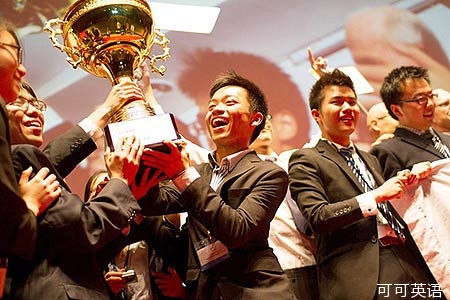
Writing business proposals, holding meetings and staying up late to execute plans - what may sound like the business world to you is just a routine for members of the Enactus team at Shanghai University of Finance and Economics (SUFE). With social responsibility in mind, students in this non profit team use their knowledge to help low-income families earn more money.
撰寫商業(yè)計(jì)劃書、召開會(huì)議、熬夜執(zhí)行計(jì)劃,這些在你看來似乎只有在商界才會(huì)發(fā)生的事情,卻是上海財(cái)經(jīng)大學(xué)創(chuàng)行團(tuán)隊(duì)的日常工作。在這個(gè)非營利性組織中,成員們謹(jǐn)記社會(huì)責(zé)任,運(yùn)用他們的知識(shí)幫助低收入家庭創(chuàng)收。
Not a simple student start-up
不僅僅只是學(xué)生創(chuàng)業(yè)那么簡單
SUFE Enactus earned a name for itself when it represented China in the Enactus 2013 World Cup in Cancun, Mexico, in September. It made it into the top eight with a project that empowers local farmers by helping them launch businesses using coffee grounds as fertilizer to grow mushrooms.
今年9月,上海財(cái)經(jīng)大學(xué)創(chuàng)行團(tuán)隊(duì)代表中國參加在墨西哥坎昆舉行的2013年Enactus(創(chuàng)行)世界杯,從而一舉成名。他們憑借一個(gè)利用咖啡渣培育可食用菌菇的助民項(xiàng)目而躋身前八強(qiáng)。
The team noticed that in metropolises like Shanghai, there is a huge waste of coffee grounds every day. So they asked for help from a mushroom growing company in Hangzhou, Zhejiang province, and Chido Govera, a Zimbabwean educator who teaches people to cultivate mushrooms using leftover coffee grounds.
這支團(tuán)隊(duì)注意到,在上海這樣的大都市,每天都有大量的咖啡渣被白白浪費(fèi)掉。因此,他們向杭州一家蘑菇種植公司以及來自津巴布韋的Chido Govera尋求幫助。Chido Govera是一名教育工作者,教人們利用廢棄咖啡渣來培育蘑菇。
Together, they developed a business plan to collect coffee grounds in order to grow mushrooms and sell them. But instead of making money from this business plan, SUFE Enactus passed it on to low-income families and let them cooperate with the mushroom company.
他們一同撰寫了一份收集咖啡渣培育食用菌并出售的商業(yè)計(jì)劃。但是上海財(cái)經(jīng)大學(xué)創(chuàng)行團(tuán)隊(duì)并未從中獲利,而是將該技術(shù)推廣到貧困家庭手中,讓他們與蘑菇種植公司合作。
“Traditionally, mushroom companies grow their mushrooms in big factories and sell quality seeds only to wholesale dealers. It’s difficult for farmers to buy seeds directly from mushroom companies. But now we have bridged this gap,” says Li Jie, 22, the project manager who is a quantitative economics major at SUFE.
就讀于數(shù)量經(jīng)濟(jì)專業(yè)、22歲的李杰(音譯)是該項(xiàng)目的負(fù)責(zé)人。他說:“一直以來,蘑菇公司都會(huì)在大型種植場(chǎng)培育菌菇,只向批發(fā)商出售優(yōu)質(zhì)菌種。農(nóng)民很難直接從蘑菇公司手中購得菌種。但如今我們?cè)谒麄冎凹芷鹆藰蛄骸!?/div>
By doing so, the Coffee Green project has enabled dozens of low-income families to cultivate and sell mushrooms in a more cost-effective and environment friendly way.
通過這種方式,這一名為“綠色咖啡”的項(xiàng)目幫助到許多貧困家庭能以更經(jīng)濟(jì)環(huán)保的方式種植和售賣菌菇。
Give back to society
回報(bào)社會(huì)
“Give a man a fish and you can feed him for a day. Teach a man to fish and you can feed him for a lifetime.” Ren Min, Secretary General Manager of Enactus China, believes that sustainable charity is more applicable when helping people in need. “We encourage Chinese students to use a sustainable business model to do charity,” she says. That’s the essence of Enactus teams.
Enactus創(chuàng)行中國總經(jīng)理任敏認(rèn)為這種可持續(xù)性慈善項(xiàng)目更適用于幫助那些有需要的人。她說:“授人以魚不如授人以漁。我們鼓勵(lì)中國學(xué)生運(yùn)用可持續(xù)性商業(yè)模式來做慈善。”這就是創(chuàng)行的宗旨。
For Xu Yiwei, 22, president of SUFE Enactus, the team is both a business and charity organization.
對(duì)于上海財(cái)經(jīng)大學(xué)創(chuàng)行團(tuán)隊(duì)主席、22歲的許一偉(音譯)而言,創(chuàng)行團(tuán)隊(duì)既是一個(gè)企業(yè),又是慈善組織。
The finance major believes that the ultimate goal of Enactus is to have a lasting positive impact on society by teaching people “how to fish”.
作為一名金融系學(xué)生,她認(rèn)為創(chuàng)行團(tuán)隊(duì)的終極目標(biāo)是通過“授人以漁”,而為社會(huì)帶來積極而長遠(yuǎn)的影響。
“We figure out a comprehensive plan for starting up a business, then teach it to the target group, helping them make more money and elevate their living standards,” she says.
她說:“我們制定一個(gè)全面的創(chuàng)業(yè)計(jì)劃,然后把它傳授給目標(biāo)群體,幫助他們盈利,從而提高生活水平。”
Self-improvement
自我提升
By participating in Enactus, students are cultivating skills and finding ways to use their knowledge. According to Liu Tianrui, 19, the PR director of SUFE Enactus who is an economics major, participating in Enactus helps him apply the business concepts taught in class.
加入創(chuàng)行團(tuán)隊(duì)后,學(xué)生們培養(yǎng)了自身技能,并找到了運(yùn)用知識(shí)的最佳途徑。19歲的經(jīng)濟(jì)專業(yè)學(xué)生劉天瑞(音譯)是上海財(cái)經(jīng)大學(xué)創(chuàng)行團(tuán)隊(duì)的公共關(guān)系負(fù)責(zé)人。他說,創(chuàng)行團(tuán)隊(duì)幫助他將課堂中學(xué)到的商業(yè)概念付諸實(shí)踐。
“All of our projects start from scratch. On the way, we constantly resort to the resources and knowledge we have in the team. This is not only a revision process, but a brainstorming process that brings different ideas, knowledge and information together,” he says.
他說:“我們整個(gè)項(xiàng)目都是‘白手起家’。在這個(gè)過程中,我們始終利用團(tuán)隊(duì)內(nèi)部的資源與知識(shí)。這不僅是對(duì)知識(shí)的復(fù)習(xí)和重建過程,更是一場(chǎng)集思廣益、匯集各種知識(shí)和信息的頭腦風(fēng)暴。”
Liu says this experience not only gives him a real sense of the business world, but also teaches him how to conduct teamwork, communicate with others and solve problems.
劉天瑞說這份經(jīng)歷不僅使他真正體驗(yàn)了一把商業(yè)領(lǐng)域,更教會(huì)他團(tuán)隊(duì)精神、以及如何與人交流并解決問題。












